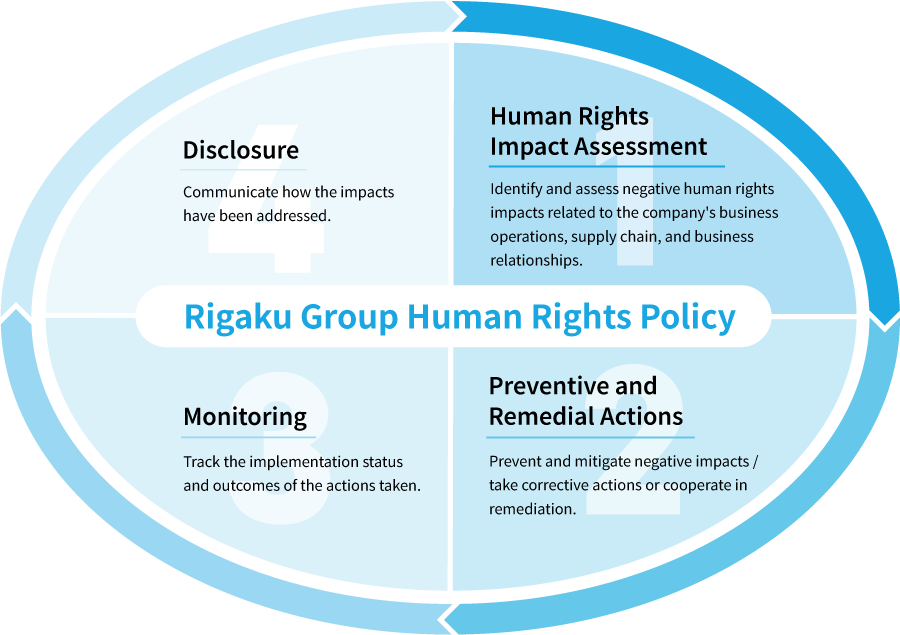Respect for Human Rights
Human Rights Policy
The Rigaku Group established ‘Rigaku Group Human Rights Policy’ in November 2023, in accordance with the Guiding Principles on Business and Human Rights endorsed by the United Nations Human Rights Council in 2011. We developed this policy based on our corporate motto, “Value our People,” and advice from external experts. This policy was approved by the board of directors, based on discussion at the Sustainability Promotion Committee, chaired by the CEO. It applies to all the executives, employees, assigned employees, and temporary workers, and declares our compliance with domestic laws, international standards, and the laws of individual countries. We would like to ask our business partners to understand and support this policy.
Promotion System
The Rigaku Group conducts human rights initiatives interdepartmentally through the Sustainability Promotion Project. The project team reports and shares the status of each activity at the Sustainability Promotion Committee. In line with the “Rigaku Group of Companies’ Human Rights Policy”, we continuously assess human rights impact, and implement responsible procurement practices for human rights, in accordance with the “Rigaku CSR Procurement Guideline” and “Rigaku Responsible Mineral Procurement Policy”.
Human Rights Due Diligence
Rigaku Group established a human rights due diligence mechanism in accordance with the United Nations Guiding Principles on Business and Human Rights. We are committed to preventing, mitigating, and eliminating adverse impacts on the stakeholders identified in the Rigaku Vision, including customers, people, society, and shareholders, in the case of human rights issues that arise.

Human Rights Impact Assessment
We began by evaluating the potential human rights impacts on our employees in Japan, based on 26 human rights issues defined in “Responding to ‘Business and Human Rights’: What Is Expected of Companies Today (Detailed Edition)” by Japan’s Ministry of Justice, with a focus on the severity and likelihood of such risks. We then expanded this assessment to our overseas operations by engaging in dialogue with each international group company to identify region-specific concerns and prioritize relevant human rights issues.
Based on these evaluations—taking into account the number of employees, the severity of issues and nature of risks, and the characteristics of each location—we identified priority human rights issues for the Rigaku Group as a whole.
For external stakeholders, including suppliers, customers, distributors, and local communities, we are committed to comprehending risks through efforts such as communication with internal involved employees, according to public indices from international organizations, and our in-house self-assessment.
Based on these evaluations, we identified the risks—rated as medium or higher in likelihood and severity among the 26 human rights issues we assessed—as priority issues to address.
As a company specializing in scientific instruments for universities, research institutes, and advanced industrial technology, we conduct our business in countries where each national law generally aligns with international standards.
At present, our assessment has not identified any human rights risks deemed severe based on our business characteristics and areas of operation. Nevertheless, we are committed to continuously strengthening our approach to human rights. We will continue to identify issues that require attention through our human rights impact assessments and take further action to make improvements as needed.
Priority Human Rights Issues
| Priority Human Rights Issues | Risks Identified | Current Actions and Future Improvements |
|---|---|---|
| Occupational Safety and Health (In-house, Suppliers) Consumer Safety and Right to Know (Customer) |
Occupational Safety and Health
Customer safety and right to know
|
|
| Working Hours (In-house, Suppliers) |
|
|
| Foreign Worker Rights (Suppliers) |
|
|
| Access to Remedy (In-house, Supplier, Customer and Local Community) |
|
|
| Discrimination (In-house, Supplier) |
|
|
| Harassment (In-house, Supplier) |
|
|
| Right to Privacy (In-house, Supplier) |
|
|
- For issues related to suppliers, we are conducting a Supplier CSR Survey, with focus on main supplies. If risks are identified based on survey responses, we then conduct a more detailed discussion with the supplier and request additional surveys or improvement measures, if necessary.
Grievance Mechanism
To promptly detect and address any violations of the “Rigaku Group Code of Conduct” and to protect employees, the Rigaku Group has established and operates an internal whistleblowing channel. There is also an in-house reporting system and a third-party reporting system available for anonymous reporting and consultation, ensuring reporters are not harmed by their whistleblowing. The reported issues are investigated and addressed appropriately after confirming the wishes of the reporters or whistleblowers.
Additionally, all stakeholders—including suppliers and residents—can use the "Contact Us" section on our website (under the "Human Rights (Discrimination/Harassment/etc)" category) to submit inquiries. We also accept anonymous submissions.
※ If a response from us is required, please provide your email address.

